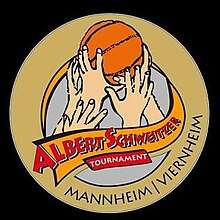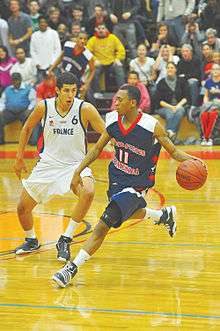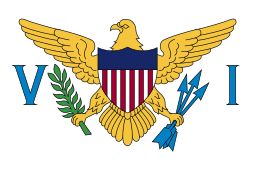Albert Schweitzer Tournament
The Albert Schweitzer Tournament (AST) is an international basketball competition that is played between national basketball teams of the Under-18 men age category. It takes place every 2 years in Mannheim, Germany, and is contested between teams from 12 countries.
 Albert Schweitzer Tournament Mannheim | |
| Sport | Basketball |
|---|---|
| Founded | 1958 |
| No. of teams | 12 |
| Country | |
| Continent | |
| Most recent champion(s) | (2nd title) |
| Most titles | (10 titles) |
| Official website | basketball-bund.de/albert-schweitzer-turnier |

Since FIBA does not organize an Under-18 world championship, the Albert Schweitzer Tournament is internationally recognized and considered a non-FIBA organized world championship for the Under-18 age group. Originally, the tournament was an Under-19 age event. The organizers of the tournament are the German Basketball Federation and the city of Mannheim. The tournament is named after Albert Schweitzer.
History
The first Albert Schweitzer Tournament took place in December 1958. It was contested between eight teams, and won by Belgium. Hans-Joachim Babies, and the German basketball pioneer, Hermann Niebuhr, asked the theologian and physician, Albert Schweitzer, if they could use his namesake for the name of the tournament. After the second tournament in 1960, there was a break in play until 1966. From that point onwards, a two-year tournament cycle was established.
From 1958 to 1971, the USA used players that were the dependents of the USA's military forces. Starting with the 1973 tournament, the USA began to use players that were selected from throughout the entire USA school system.
The 1991 tournament was canceled, due to the Gulf War. Since 1994, the tournament has been held during even-numbered years.[1]
The USA has won the most titles, winning ten. The USA is followed by Italy with four titles. The record attendance was 28,763 spectators.
Due to the spread of the Coronavirus disease, the 2020 tournament was cancelled.[2]
Results
| Year | Gold Medal | Silver Medal | Bronze Medal | 4th Place |
|---|---|---|---|---|
Performance by nation
Future stars
The tournament is an important event for professional basketball scouts from around the world. Over the years, many players that have played at the tournament have gone on to become well-known pro players, both in the NBA, and the EuroLeague.[9][10]
Some of the NBA players that have played at the AST, include:


















.svg.png)

















.svg.png)
.svg.png)
.svg.png)
%3B_Flag_of_Serbia_and_Montenegro_(2003%E2%80%932006).svg.png)
























.svg.png)
.svg.png)
.svg.png)
.svg.png)
.svg.png)
In addition to that, some of the players that have played in various international senior men's professional top-tier national domestic leagues, and that have also played at the AST, include:





















































































.svg.png)


Awards
MVP Award
| Year | MVP |
|---|---|
Burkhard Wildermuth Prize
The Burkhard Wildermuth Prize, or Burkhard Wildermuth Award, was first awarded in 2006, and is given to the player in each tournament that is deemed to be the "Most Talented Player". The award is named after Dr. Burkhard Wildermuth, the long-time co-organizer of the Albert Schweitzer Tournament.
| Year | Most Talented Player |
|---|---|
All-Tournament Team
- 2000:[12]
- 2006:
- 2008:
- 2010:
.svg.png)

.svg.png)
.svg.png)

- 2012:





- 2014:





- 2016:[13]





- 2018:[14]
See also
- TBF Under-16 World Cup
- FIBA Under-17 World Cup
- FIBA Under-19 World Cup
References
- "AST-basketball.de It all started in December 1958". Archived from the original on 2014-10-06. Retrieved 2014-09-27.
- "Albert Schweitzer Turnier 2020 fällt aus – AST 2020 is canceled « Deutscher Basketball Bund". Retrieved 2020-03-16.
- AST-basketball.de Turnierergebnisse (in German).
- Schoenen-dunk.de Australien triumphiert verdient (in German).
- Nikola Radicevic wird MVP des AST 2012 – Radicevic honoured as MVP. (in German).
- US-Boy Ethan Happ ist AST-MVP 2014! (in German).
- "AST 2016: Deutschland erstmals Turniersieger!". basketball-bund.de. German Basketball Federation. 2 April 2016. Retrieved 2 April 2016.
- "AST 2018: Deutschland verteidigt den Titel!". basketball-bund.de. German Basketball Federation. 7 April 2018. Retrieved 7 April 2018.
- "AST-basketball.de Magic Johnson was a part of AST in 1975". Archived from the original on 2014-10-06. Retrieved 2014-09-27.
- 2000 Albert Schweitzer Tournament.
- HARIS MARKOPOULOS From Matt Blair for HH:
- Μισάν Νικαγκμπάτσε, ο Άιβερσον του Ολυμπιακού! (in Greek).
- "Kostja Mushidi ist MVP des AST 2016". basketball-bund.de (in German). German Basketball Federation. 2 April 2016. Retrieved 2 April 2016.
- "AST 2018: Jonas Mattisseck ist MVP". basketball-bund.de (in German). German Basketball Federation. 7 April 2018. Retrieved 7 April 2018.
External links
- Official Website (in German and English)
- Official Archive Website (in German)
- Albert Schweitzer Tournament History (in English)
- Albert Schweitzer Tournament Stars (in English)
- Albert Schweitzer Tournament Results 1958–2008 (in German)
- Albert Schweitzer Tournament Results 2010 (in German and English)
- Albert Schweitzer Tournament Results 2012 (in German)
- Albert Schweitzer Tournament Results 2014 (in German)
